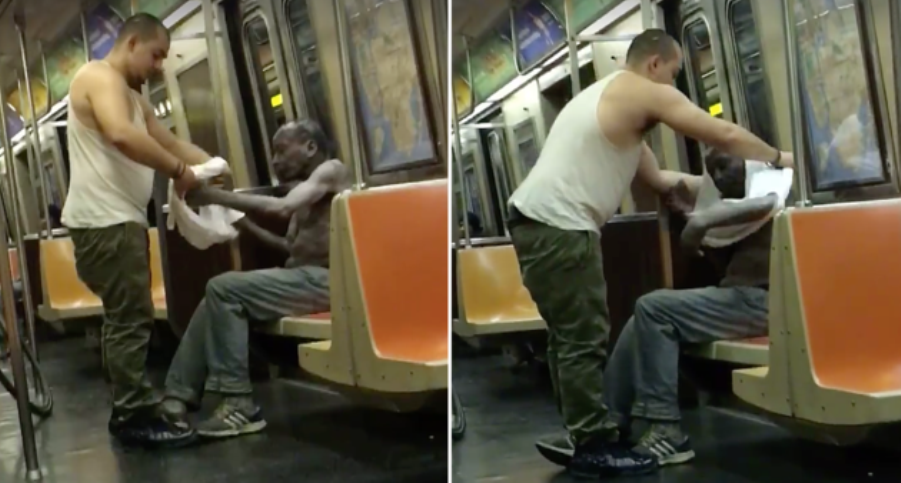
Last Friday, on a New York subway, a simple act of compassion was captured on a phone which has been viewed by millions. A young man is seen literally taking the shirt off his back and helping a shirtless and shivering homeless man.
Joey Resto is the 23-year-old man on the left. Interviewed by a Fox News affiliate in New York, Resto described the encounter.
“I walked on the train and the homeless guy was there with his shirt off. Everyone on there had separated themselves from him. He looked like he had gotten beaten up. He had patches of hair missing. He had no shirt on. I sat in front of him and did a Snapchat video of the gentleman. It was crazy that everyone was just looking and not doing anything. It was freezing outside,” Resto said.
Resto then got up, took off his shirt and hat and helped the man put them on.
“It was the least I could do. I didn’t know what was going to be his reaction. He looked like he had a mental disability. He couldn’t physically put it on. I had to put it on him like a child,” Resto added.
Before getting off the train, Resto offered further help. “I asked him to come with me to get a hot meal, but as we waited he fell asleep.”
Resto’s story reminded me of another, more vocal act of compassion told to me by comic book writer Paul S. Newman when he was traveling in Spain.
“Years ago, I was sitting at a bullfight in Malaga. Despite the bull breaking a horn against the barricade, they let the fight continue. The crowd booed and many tossed their seat pillows into the arena. A Civil Guard, with his imposing black cockade hat, grabbed up a man one row behind me for throwing a pillow. Hundreds of pillows covered the arena floor, but he was the only person the police had started to arrest. And he was the only Black in the audience.
“He was an American serviceman who, under Franco’s rule, could not appear in public in uniform. The reason he was pulled from his seat was obvious – he was a Black sitting with a companion who was a white woman. As the Civil Guard started to lead him off, I left my wife and children, bounded up the stairs and began protesting. In rapid, ungrammatical Spanish, I shouted that the Civil Guard had no right to arrest this man unless they arrested some of the others who also had thrown pillows into the ring but happened to be white. The black soldier told me to walk away or I might get into trouble. I was too furious to care. I flashed my American passport, which in those days indicated one’s profession. Mine was listed as ‘journalist,’ because I was then writing two, world syndicated newspaper comic strips, The Lone Ranger and Laugh-In.
“I told the officer that if he didn’t release the soldier, over two-hundred papers around the world would write up this incident, and I didn’t think the then ruling Franco would be too pleased. The Civil Guard released the GI. When the soldier asked how he could thank me, I said, ‘Remember this. Someday I might need your help. I’m also a member of a minority. I’m Jewish.’ ”
I’ve no doubt that stories like those of Joey Resto and Paul Neuman happen regularly, but don’t make national news. Nonetheless, they should reinforce in all of us the fact individuals can and do make a difference in the lives of others.
Comments









